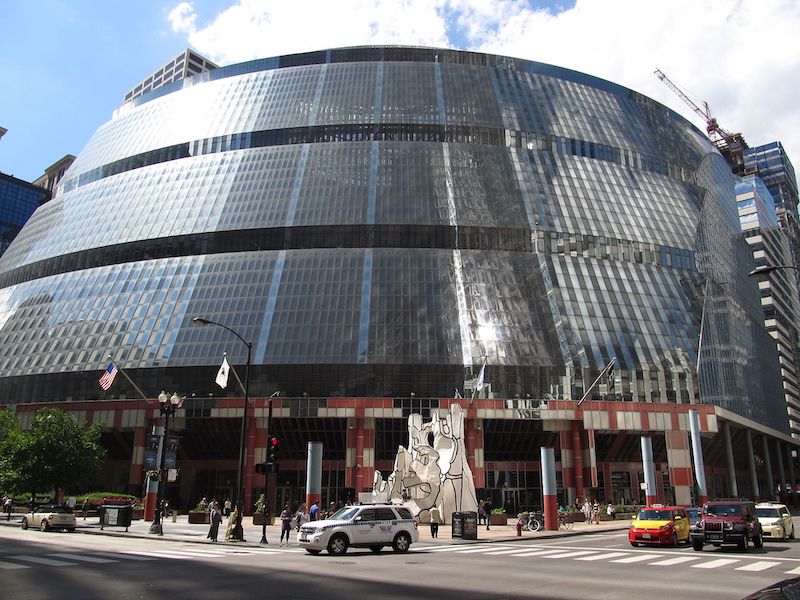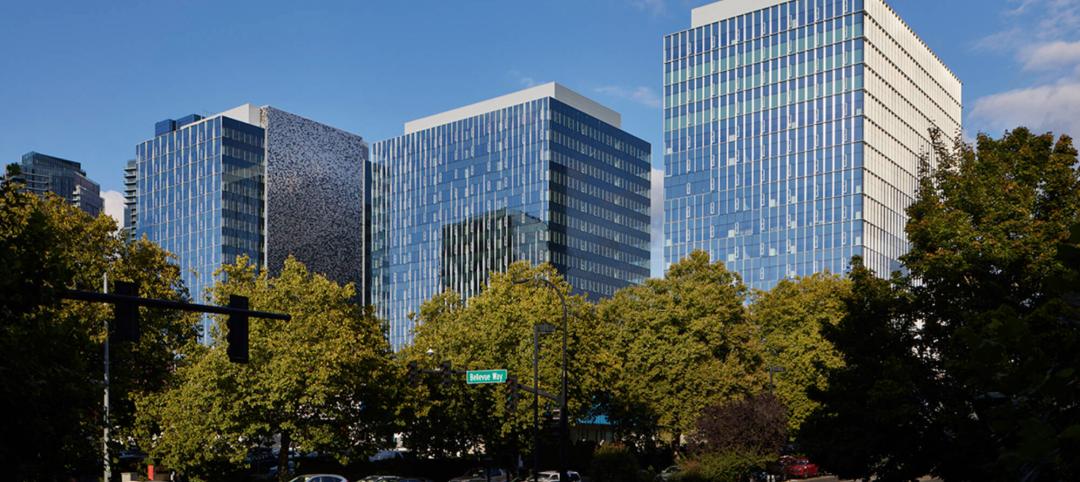The Chicago Architecture Center (CAC) and the Chicago Architectural Club have announced an architectural design competition calling for new, creative visions for the State of Illinois “Thompson” Center designed by Helmut Jahn, built in 1984 and put up for sale in May 2021 by the State of Illinois. The competition seeks to give the building new life through restorative architecture while preserving its architecture and public character. The competition is open to anyone with a vision for the building including students, architects, designers, planners and artists. Competition registration, available through the Chicago Architecture Club website, closes on July 2 and competition submissions are due July 19. The winning design will be announced in August.
"The Thompson Center, the focus of the 2021 Chicago Prize Competition, is a poignant subject to reimagine as this iconic structure and site faces a doubtful future and as we speculate on the "post-pandemic” contemporary city," said Elva Rubio, Chicago Architecture Club co-president. "The Chicago Architectural Club is pleased to partner with the Chicago Architecture Center to support this initiative on behalf of Chicago and the global design community."
The sale and possible demolition of the Thompson Center has been controversial among architecture and design professionals in Chicago and around the world leading to the creation of The James R. Thompson Historical Society that gave public tours of the building. Despite the toll caused by lack of maintenance, Helmut Jahn’s design of the Thompson Center is prized by the design world as a unique example of post-modern architectural design in a civic building meant to draw citizens into the daily workings of government.
From the competition brief:
“The Thompson Center’s design was progressive for its time. Dwelling in the vertical shadows of modern icons like Mies van der Rohe’s Daley Center, Helmut Jahn’s mid-rise Thompson Center pierced the trends of neighboring International Style and Neoclassical buildings with a revolutionary concept for a civic building, one that represents a promising future of ‘transparency and accessibility’.
“Bringing together the various services of government offices in one building, the Thompson Center is also a major transit hub and a place for gathering to enjoy art, shop, and dine. Jahn brings open space indoors with the remarkable glazed 17-story grand atrium. Known as a “people’s center” or a “people’s palace”, the building was a symbol of government accessibility, transparency, and commitment to serving the people. This was a bold departure from how government buildings used to interface with the public.“
The jury to select the winning design submission will be announced later in June.
Legacy of Helmut Jahn - January 4, 1940 - May 8, 2021
Helmut Jahn, FAIA, has earned a reputation on the cutting edge of progressive architecture. His buildings have had a “staggering” influence on architecture according to John Zukowsky, former Associate Curator of Architecture at the Art Institute of Chicago. Jahn’s buildings have received numerous design awards and have been represented in architectural exhibitions around the world.
Born in Germany, Jahn graduated from the Technische Hochschule in Munich. He came to the United States for graduate studies in architecture at the Illinois Institute of Technology. After attending IIT, he worked at C. F. Murphy Associates as a Project Architect under Gene Summers, designing the new McCormick Place. In 1976, his first major high-rise building in Chicago, Xerox Centre, received great critical acclaim.
Jahn has been called Chicago’s premier architect who has dramatically changed the face of Chicago. His national and international reputation has led to commissions across the United States, Europe, Africa, and Asia. His projects have been recognized globally for design innovation, vitality, and integrity. Featured in numerous publications, his work has generated much excitement amongst the press and general public alike.
Jahn’s work has been included in exhibits worldwide since 1980. He has taught at the University of Illinois at Chicago, was the Elliot Noyes Professor of Architectural Design at Harvard University and the Davenport Visiting Professor of Architectural Design at Yale University, and Thesis Professor at IIT.
About the State of Illinois “James R. Thompson Center”
Designed by Helmut Jahn, the State of Illinois Center, also known as James R. Thompson Center, is facing the threat of complete demolition. Located in the Chicago “Loop” it is a major transportation node, commercial center, and workspace. The building has been criticized for being ugly, oversized, inefficient, and poorly maintained. However, the Thompson Center has been pivotal to urban transit and a highly democratic contemporary civic center. At the time of its construction in 1985, Helmut Jahn’s State of Illinois Center was a stark contrast to Chicago’s historic and modernist architecture, yet today it is an architectural icon in its own right. For the fourth year in a row, the Thompson Center has been listed in the Landmarks Illinois’ annual Most Endangered Historic Places in Illinois and it was included in Preservation Chicago’s Chicago 7 Most Endangered list in 2018, 2019, and 2020.
About the Chicago Architecture Center
The Chicago Architecture Center (CAC) is a nonprofit organization founded in 1966, dedicated to inspiring people to discover why design matters. A national leader in architecture and design education, the CAC offers tours, programs, exhibitions, and more that are part of a dynamic journey of lifelong learning.
Opened to the public in 2018, its riverfront location is in the heart of the city, where Michigan Avenue meets the Chicago River, featuring nearly 10,000 square feet of exhibition space with views of a century of iconic skyscrapers.
Through partnerships with schools and youth-serving organizations, the CAC reaches approximately 30,000 K-12 students annually, while teacher workshops provide educators with tools and resources they need to advance STEM curricula in their classrooms. Committed to serving under-represented communities in construction, engineering, and design professions, the CAC offers many of its education programs—and all of its programs for teens—at no cost to participants. CAC programs for adults and members include talks with acclaimed authors and practicing architects, in-depth presentations on issues and trends in urbanism, and classes unlocking subjects related to the built environment
About the Chicago Architectural Club
The Chicago Architectural Club provides an open forum, an infrastructural framework and support platform for architects, artists and writers to discuss, challenge and enrich a dialogue among practitioners and scholars.
The Chicago Architectural Club organizes and hosts annually recurring international architecture competitions, lectures and exhibitions that foster debates within contemporary theory and criticism in art and architecture in order to promote a younger generation of architects and designers. Through our publications, outreach and collaboration we seek to engage the city of Chicago, its public and the larger audience of artist, architects and designers throughout the world.
Related Stories
AEC Tech Innovation | Oct 8, 2024
New ABC technology report examines how AI can enhance efficiency, innovation
The latest annual technology report from Associated Builders and Contractors delves into how artificial intelligence can enhance efficiency and innovation in the construction sector. The report includes a resource guide, a case study, insight papers, and an essay concerning applied uses for AI planning, development, and execution.
Healthcare Facilities | Oct 8, 2024
Herzog & de Meuron completes Switzerland’s largest children’s hospital
The new University Children’s Hospital Zurich features 114 rooftop patient rooms designed like wooden cottages with their own roofs. The project also includes a research and teaching facility.
Mixed-Use | Oct 7, 2024
New mixed-use tower by Studio Gang completes first phase of San Francisco waterfront redevelopment
Construction was recently completed on Verde, a new mixed-use tower along the San Francisco waterfront, marking the end of the first phase of the Mission Rock development. Verde is the fourth and final building of phase one of the 28-acre project that will be constructed in several phases guided by design principles developed by a design cohort led by Studio Gang.
Brick and Masonry | Oct 7, 2024
A journey through masonry reclad litigation
This blog post by Walter P Moore's Mallory Buckley, RRO, PE, BECxP + CxA+BE, and Bob Hancock, MBA, JD, of Munsch Hardt Kopf & Harr PC, explains the importance of documentation, correspondence between parties, and supporting the claims for a Plaintiff-party, while facilitating continuous use of the facility, on construction litigation projects.
Glass and Glazing | Oct 7, 2024
Pattern language: An exploration of digital printing on architectural glazing
Architectural Glazing has long been an important expressive tool which, when selected and detailed thoughtfully, can contribute to the successful transformation of architectural concepts to reality.
University Buildings | Oct 4, 2024
Renovations are raising higher education campuses to modern standards
AEC higher ed Giants report working on a variety of building types, from performing arts centers and libraries to business schools. Hybrid learning is seemingly here to stay. And where possible, these projects address wellness and mental health concerns.
AEC Tech | Oct 3, 2024
4 ways AI impacts building design beyond dramatic imagery
Kristen Forward, Design Technology Futures Leader, NBBJ, shows four ways the firm is using AI to generate value for its clients.
Laboratories | Oct 2, 2024
Trends in scientific research environments: Q&A with Flad's Matt McCord
As part of an ongoing series, Matt McCord, AIA, NCARB, LEED AP BD+C, Associate Principal with Flad Architects, discusses the future of the scientific workplace.
Museums | Oct 1, 2024
UT Dallas opens Morphosis-designed Crow Museum of Asian Art
In Richardson, Tex., the University of Texas at Dallas has opened a second location for the Crow Museum of Asian Art—the first of multiple buildings that will be part of a 12-acre cultural district. When completed, the arts and performance complex, called the Edith and Peter O’Donnell Jr. Athenaeum, will include two museums, a performance hall and music building, a grand plaza, and a dedicated parking structure on the Richardson campus.
Data Centers | Oct 1, 2024
10 biggest impacts to the data center market in 2024–2025
While AI sends the data center market into the stratosphere, the sector’s accelerated growth remains impacted by speed-to-market demands, supply chain issues, and design innovation necessities.

















